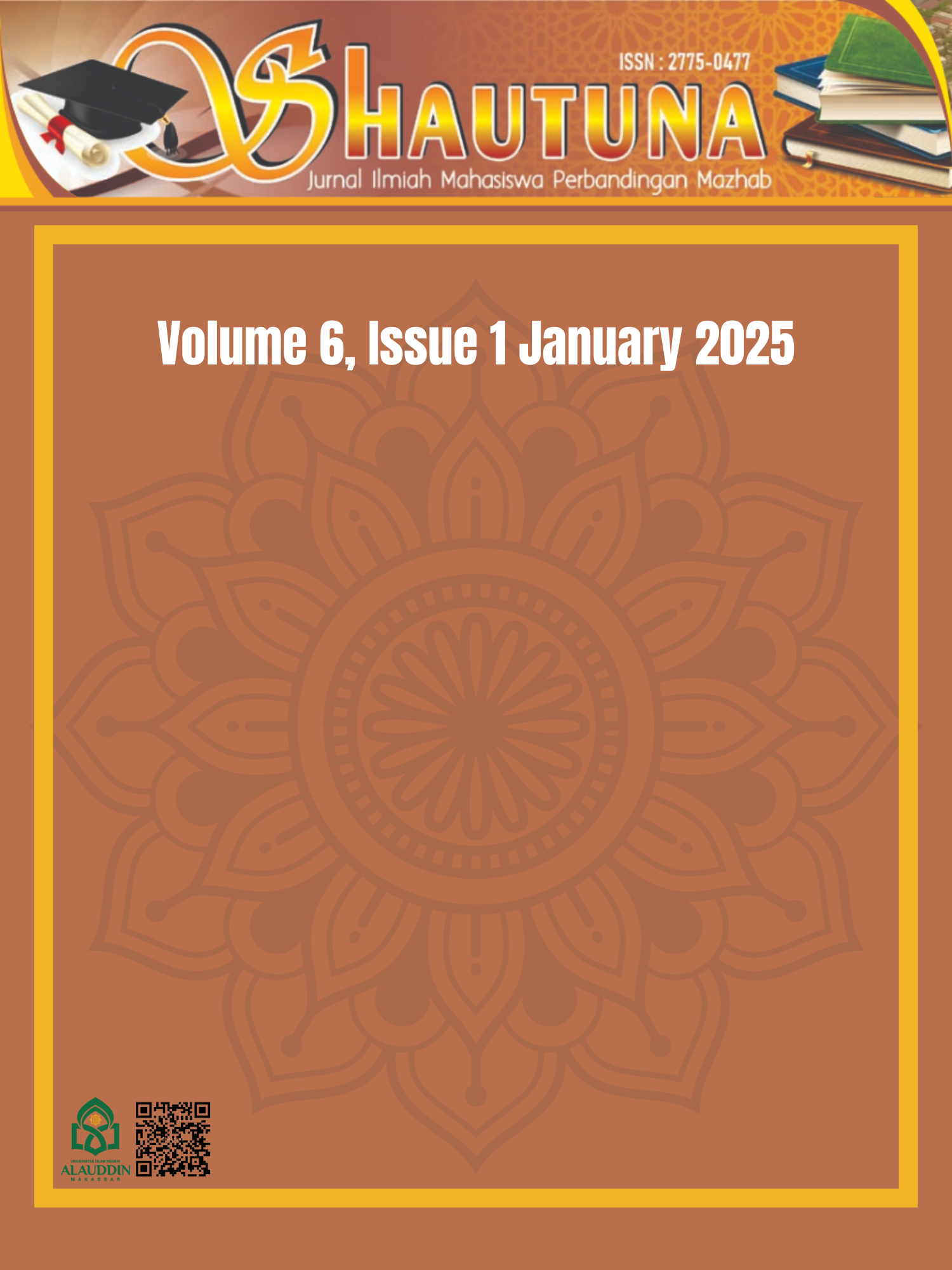The Dynamics of Panai' Money in Makassar City After the Fatwa of MUI of South Sulawesi No. 2 Year 2022
Measuring Sharia Compliance and Preservation of Tradition
DOI:
https://doi.org/10.24252/shautuna.v6i1.54136Keywords:
Money Panaik, Fatwa of MUI of South Sulawesi No. 2 Year 2022, Sharia Compliance, Preservation of TraditionAbstract
This study aims to analyze the influence of the Fatwa of the Indonesian Ulema Council (MUI) of South Sulawesi No. 2 of 2022 on panai' money and its implications for Bugis marriage practices in Bangkala Village, Manggala District, Makassar City. The subject matter of this research focuses on how the implementation of the fatwa on the tradition of panai' money in Bugis society. This research uses a qualitative approach with a descriptive-analytical method. Data were collected through in-depth interviews with traditional leaders, scholars, and the community, participatory observation, and documentation of the fatwa text and related social practices. The results show that panai' money still has an important position in the traditional structure of the Makassar Bugis community and is seen as a form of respect and a symbol of the man's social responsibility towards the woman. Although the fatwa of MUI South Sulawesi states that panai' money is a custom whose law is permissible as long as it is not burdensome, its implementation in the community has not shown significant changes. The lack of socialization and education from religious institutions and related parties is a factor inhibiting the understanding and application of the contents of the fatwa as a whole. The implication of this finding is that the preservation of customary values must be accompanied by a proportional understanding of Sharia so that tradition does not become a barrier to marriage. Intensive cultural and educative approaches are needed so that this fatwa can be accepted and implemented by the community in accordance with moderate and contextual Islamic values.
References
Ahmad, Suryadin, Fatum Abubakar, and Muhammad Husein. “Budaya Dan Simbol Dalam Ritual Pernikahan Adat Ternate: Studi Kasus Kelurahan Dufa-Dufa.” Jurnal Ilmiah Wahana Pendidikan 10, no. 10 (May 31, 2024): 1010–22. https://doi.org/10.5281/zenodo.11561145.
Alimuddin, Asriani. “Makna Simbolik Uang Panai’pada Perkawinan Adat Suku Bugis Makassar Di Kota Makassar.” Al Qisthi 10, no. 2 (2020): 117–32. https://doi.org/10.47030/aq.v10i2.85.
Amrin, Amrin, Sugiyarto Sugiyarto, and Ishma Amelia. “Panai Tradition in Bugis Makassar Society in Bima: Islamic Law Perspective.” Al-Insyiroh: Jurnal Studi Keislaman 10, no. 2 (September 30, 2024): 221–48. https://doi.org/10.35309/alinsyiroh.v10i2.293.
Anzaikhan, M, Fitri Idani, and Muliani Muliani. “Moderasi Beragama Sebagai Pemersatu Bangsa Serta Perannya Dalam Perguruan Tinggi.” Abrahamic Religions: Jurnal Studi Agama-Agama 3, no. 1 (2023): 17–34. https://doi.org/10.22373/arj.v3i1.16088.
Diningrat, Himas, Aggita Harsya Fahrezy, Ilham Jeryawan, and Sara Yogi Istiqomah. “Tinjauan Hukum Islam Terhadap Uang Panai Dalam Perkawinan Adat Bugis.” Jurnal Syntax Admiration 5, no. 5 (2024): 1892–99. https://doi.org/10.46799/jsa.v5i5.1131.
Fahmi, Ahmad. “Konstruksi Hukum Adat Pernikahan Masyarakat Melayu Palembang Berdasarkan Syar’iat Islam.” Medina-Te: Jurnal Studi Islam 15, no. 1 (2019): 17–38. https://doi.org/10.19109/medinate.v15i1.3772.
H, Shabrina al, Rodearni Purba, and Nani Solihati. “Umpasa Dan Umpama Dalam Prosesi Adat Pernikahan Suku Batak Toba : Kajian Antropolinguistik.” Silampari Bisa: Jurnal Penelitian Pendidikan Bahasa Indonesia, Daerah, Dan Asing 7, no. 2 (December 24, 2024): 103–15. https://doi.org/10.31540/silamparibisa.v7i2.3211.
Hamzah, Erni Irmayanti. “Tradisi Mabbaca Doang Masyarakat Suku Bugis Kelurahan Kabonena Kecamatan Ulujadi Kota Palu.” Moderasi: Jurnal Studi Ilmu Pengetahuan Sosial 2, no. 1 (2021): 25–40. https://doi.org/10.24239/moderasi.Vol2.Iss1.38.
Iqbal, Muhammad, and Sudirman L. “Mahar Dan Uang Panaik Perkawinan Pada Tradisi Masyarakat Dalam Pandangan Hukum Islam (Studi Kasus Di Kelurahan Limpomajang Kacamatan Marioriawa Kabupaten Soppeng).” Inspiratif Pendidikan 9, no. 2 (2020): 128–48. https://doi.org/10.24252/ip.v9i2.16787.
N., Zahrum, and Anita Marwing. “Tinjauan Hukum Islam Terhadap Uang Panai’ Dalam Tradisi Pernikahan Suku Bugis-Makassar.” BUSTANUL FUQAHA: Jurnal Bidang Hukum Islam 4, no. 2 (August 25, 2023): 266–82. https://doi.org/10.36701/bustanul.v4i2.935.
Putri, Nadia Ananda, Kasuwi Saiban, Sunarjo Sunarjo, and Khotbatul Laila. “Kedudukan Uang Panaik Sebagai Syarat Perkawinan Dalam Adat Suku Bugis Menurut Hukum Islam.” Bhirawa Law Journal 2, no. 1 (2021): 130–40. https://doi.org/10.26905/blj.v2i1.5852.
Rahman, Abdul. “Praktek Permodelan Kebijakan.” AMU Press 1, no. 1 (February 10, 2025): 1–77. https://ejournal.amertamedia.co.id/index.php/press/article/view/392.
Subandi, Agus. “Nilai Spiritual Tradisi Temu Manten Adat Jawa Dalam Perspektif Masyarakat Buddhis.” Jurnal Pendidikan, Sains Sosial, Dan Agama 4, no. 1 (2018): 43–56. https://radenwijaya.ac.id/jurnal/index.php/PSSA/article/view/36.
Umasugi, Asmi Ningsi, Arizal Hamizar, and Muammar W Maruapey. “Perspektif Ekonomi Islam Dalam Permintaan Uang Pernikahan Di Desa Lekosula Maluku Utara.” Jurnal Ilmiah Ekonomi Dan Manajemen 2, no. 2 (2024): 651–59. https://doi.org/10.61722/jiem.v2i2.1025.
Usman, Silviyana, and Tenriwaru Tenriwaru. “Value Of Panai’on Social Capital Conceptcultural Study In South Sulawesi.” SIMAK 20, no. 01 (2022): 97–115. https://doi.org/10.35129/simak.v20i01.293.
Wardani, Ayu Pramudia Kusuma. “Dowry and Panaik Money from an Islamic View (Case Study of Makassar Bugis Community Marriages in Asmat Regency, South Papua).” Al-Afkar, Journal For Islamic Studies 7, no. 3 (2024): 163–82. https://doi.org/10.31943/afkarjournal.v7i3.1295.
Downloads
Published
How to Cite
Issue
Section
License
Copyright (c) 2025 Nasmi Nasmi, Muammar Bakry, Abdul Wahid Haddade, Abdul Salam

This work is licensed under a Creative Commons Attribution 4.0 International License.









